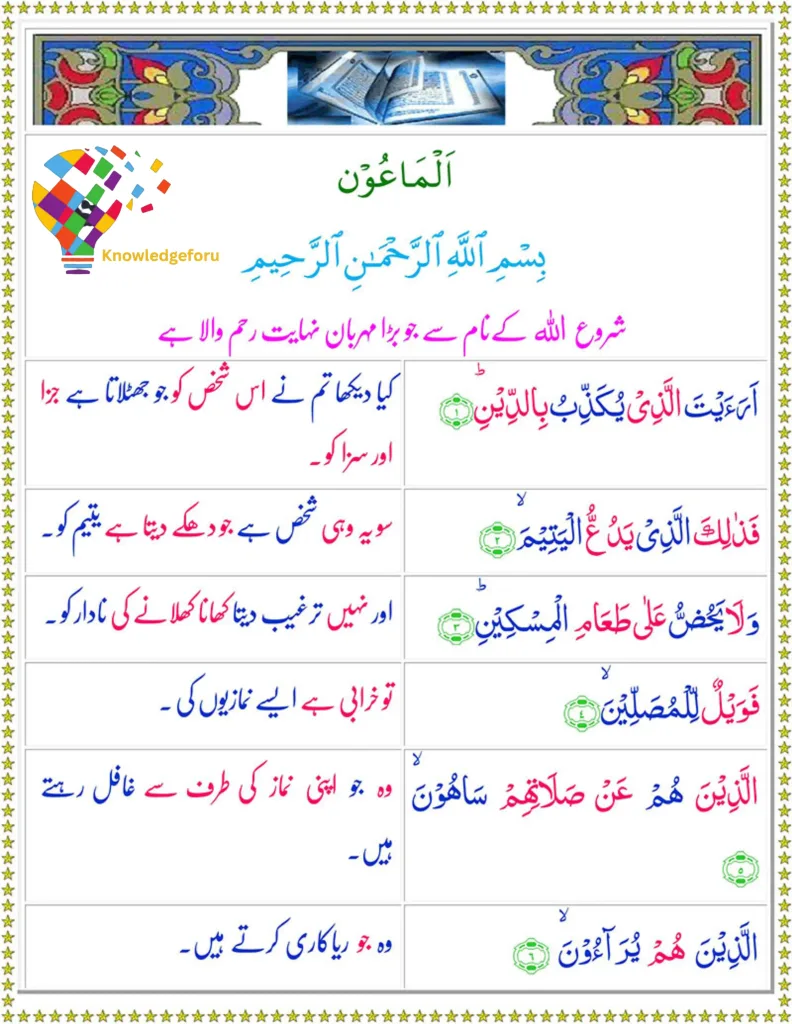Surah al maun read online
Surah Al Maun (Arabic: الماعون) is the 107th surah of the Quran. It is a Makki surah, meaning it was revealed in Mecca before the Prophet Muhammad (PBUH) and his followers migrated to Medina. It has 7 verses.
The name “Al Maun” comes from the word “Maun” which means “small acts of charity” or “sadaqah” in Arabic, and the surah is so named because it talks about the importance of giving charity, especially to those in need.
The surah focuses on the importance of helping the poor and the needy and encourages Muslims to give generously to those who are less fortunate. It also reminds Muslims that their wealth and possessions are a trust from God and that they will be held accountable for how they use them. It also warns that those who do not give charity will be punished in the Hereafter.
It is considered an important surah as it addresses the fundamental concept of charity and helping others which is an important aspect of Islamic teachings. The surah encourages Muslims to be generous and to be mindful of the needs of others.
It is also considered a highly rewarding chapter to recite, as it is believed that reciting it will result in abundance and blessings in this life and the next.
Listen surah Al maun
Surah Al maun with Urdu translation

Surah Al maun
Benefits of surah Al maun
Surah Al Maun has several benefits for believers, some of which include:
- Encouragement to give charity: The surah encourages Muslims to give generously to those in need and to be mindful of the needs of others.
- A reminder of accountability: The surah reminds Muslims that their wealth and possessions are a trust from God and that they will be held accountable for how they use them.
- Warning of punishment: The surah serves as a warning to those who do not give charity, that they will be punished in the Hereafter.
- Promotes social welfare: The surah promotes the idea of social welfare, that it is the responsibility of the community to take care of the poor and the needy.
- Short and easy to memorize: As it has only 7 verses, it is easy to memorize and can be recited regularly as part of daily prayers or as a supplication.
- Rewards for reciting it: Many Muslims believe that reciting this surah will result in abundance and blessings in this life and the next.
It is important to note that the Quran is considered the word of God in Islam and its recitation, studying, and understanding are considered important deeds to do in the life of a Muslim. The benefits of reciting any surah are not limited to the above-mentioned but vary depending on the individual and their understanding of the surah.
Wzaif of surah Al maun
In Islamic tradition, there are certain supplications or “wazaif” that are recited along with the recitation of specific surahs of the Quran, including Surah Al Maun. This wazaif are believed to enhance the benefits of reciting the surah and to bring additional blessings and rewards.
One commonly recited wazif for Surah Al Maun is to recite the surah 100 times after the Fajr (morning) prayer, and then make dua (supplication) for any specific need or concern. It is believed that by doing so, one’s needs will be fulfilled by the grace of God.
Another wazif for Surah Al Maun is to recite the surah before giving out charity or performing any act of kindness, as it is believed that by doing so the reward for the good deed will be multiplied.
It is also reported that whoever recites this surah in abundance during the month of Ramadan, will have their sins forgiven by the end of the month.
It is important to note that this wazaif is not considered obligatory by Islamic law and is based on Islamic tradition. The recitation of the Quran is considered an important act of worship in and of itself, and any additional benefit is considered a blessing from God. Wazaif should be practiced to seek closeness to God and not for the sake of material gain.
IF you read more surah of al Quran then click here.





